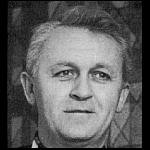
 |
||
| Auld | ||
|
*
biography
|
||
| Baghy | ||
| Boulton | ||
| Kalocsay | ||
| Mikhalsky | ||
| Szathmari | ||
| Home | ||
| Esperanta versio | ||
| DHTML version for version 4 browsers | ||
|
William Auld is the most renowned of the four poets and prose writers who burst onto the Esperanto literary scene in 1951, with the publication of Kvaropo, thus establishing the "Scottish School". The other three members of the quartet were John Dinwoodie, John Francis and Reto Rossetti. Auld had in fact debuted earlier during the latter days of Literatura Mondo (1947-49) and from 1949 to 1955 he edited the modest but historically significant periodical Esperanto en Skotlando which was a forum for the young writers of that time. The publication of Kvaropo also marked the emergence of Stafeto, the publishing house established by Prof Juan Regulo-Perez in La Laguna, which filled the gap left by the disappearance of Literatura Mondo and its publishing activities. Born in 1924, Auld learned the language in 1937 but didn't become active on the literary scene until 10 years later, after establishing himself in his career as a teacher of English Literature. He collaborated on a number of periodicals and was editor not only of Esperanto en Skotlando, but also of Esperanto (UEA) from 1955 to 1958, Monda Kulturo from 1962 to 1963, the Brazilian-based literary revue Fonto from 1981 to 1989, as well as the literary section of the monthly current affairs magazine Monato, from its inception in 1979 until 1998. His contribution to Kvaropo is called Spiro de l'Pasio (Breath of Passion). In 1956 his most famous work - La Infana Raso (The Infant Race), was published. Original poems can also be found in Unufingraj Melodioj (One-finger Melodies), 1960, and in his last collection - Humoroj (Moods), published in 1969. Auld's role in the Esperanto literary community has not been resricted to mere versification. He also edited the poetry section of the two volumes of the Angla Antologio, which appeared initially in 1957, and both editions of the 900 page Esperanta Antologio, 1958 and 1987. That he is a noted critic and essayist, is evidenced by his introduction to the latter anthology and by his four published volumes of literary criticism: Pri Lingvo kaj aliaj Artoj (On Language and other Arts) published in 1978, Enkonduko en la Originalan Literaturon de Esperanto, (An Introduction to the Original Literature of Esperanto) published in 1979, Vereco, Distro, Stilo (Realism, Entertainment and Style) - a dissertation on the original novels written in Esperanto up to 1981, and most recently - Pajleroj kaj Stoploj (Straw and Stubble), published in 1998. |
|||
| TOP | |||